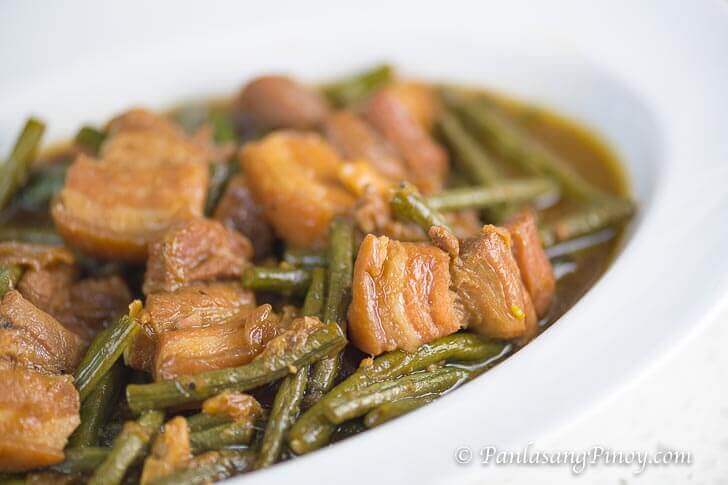Adobong Sitaw Recipe
Adobong Sitaw is a Filipino dish wherein string beans are cooked using the inadobo method. It is savory, slightly tangy, and packed with flavor.
This post may contain affiliate links. Please read our disclosure policy.
Adobong Sitaw is a vegetable dish composed of string beans cooked adobo style. As you might have noticed, almost all ingredients can be cooked using the famous adobo style – be it meat or vegetables. Chicken Adobo, Pork Adobo, Adobong Kambing, and Adobong Pusit are just few of the adobo dishes that we have featured – so far. Of course, it includes this Adobong Sitaw Recipe.

Using pork in this Adobong Sitaw recipe is optional. If you are one of our vegan friends, you can still enjoy this dish even when pork is not around. I only included pork in this recipe to add a little meaty taste to it, since I am a certified carnivore – as you might have known by now.
How to Cook Adobong Sitaw
Prepping the sitaw takes about 5 minutes, depending on how much you’re using. But once you’re done with that (which isn’t too much work), the rest of the cooking is super easy to follow.

- Sear the Pork to Release Flavor – Heat a wok over medium heat and add the pork belly. Let it cook until the fat starts to melt and coat the pan. This step adds richness to the dish and helps develop a deeper flavor.
- Sauté the Aromatics – Add the crushed garlic and stir until it turns light brown, bringing out its fragrance. Then, toss in the sliced onion and cook until soft. These ingredients build the dish’s base flavors.
- Add soy sauce, vinegar, and water – Pour in the soy sauce, vinegar, and water. Let it come to a boil without stirring to allow the vinegar to balance the flavors.
- Simmer the pork until tender – Cover the wok, lower the heat, and let the pork cook until tender. Add more water if needed to prevent it from drying out.
- Add the String Beans – Add the cut string beans and mix well. Let them cook for about 3 to 5 minutes, allowing them to absorb the sauce while staying slightly crisp.
- Season Before Serving – Sprinkle sugar, ground black pepper, and salt to taste. Stir and continue cooking until the string beans reach your preferred tenderness. Once done, transfer to a serving bowl and enjoy your Adobong Sitaw with rice!
Things You Need to Know & Some tips
- Why Use Pork Belly? Pork belly has just the right amount of fat to make the dish rich and flavorful. As it cooks, the fat melts and blends with the sauce, making it really savory. If you want a lighter version, you can use tofu, just like in my Adobong Sitaw with Tofu recipe.
- Why Add Sugar? I put a little sugar because it balances out the salty and tangy flavors from the soy sauce and vinegar. It rounds out the taste and keeps the dish from being too sharp. But don’t overdo it—just a small amount is enough.
- Why Not Overcook the Sitaw? Overcooked sitaw turns mushy and loses its fresh, slightly crunchy bite. To keep it perfect, cook it just until it’s tender but still has a bit of snap. Just follow my recipe and all will turn out well.
- Got leftovers? Adobong Sitaw tastes even better after a few hours as the flavors soak in. Just reheat it gently so the sitaw doesn’t get too soggy. It’s a bonus if you also have leftover Lechon Kawali because combining the two makes a great dish—Adobong Sitaw with Lechon Kawali!

I like this healthy vegetable recipe not just by its nutritional value, making adobo out of string beans brings out this vegetable’s natural flavor which is often overpowered by other vegetables and ingredients in dishes such as Pakbet Tagalog, Pakbet Ilocano, Kare Kare, and Sinigang na baboy.
How to Prepare the Sitaw for Adobo
Getting the string beans ready for Adobong Sitaw is very easy. First, give them a good rinse to wash off any dirt. Then, chop off the ends—those tough tips aren’t fun to chew. Finally, cut them into bite-sized pieces, and that’s it! Now they’re all set while you get the rest of the ingredients ready.

Other Adobong Sitaw Recipes
Sitaw is one of those veggies that always shows up in different dishes because it has a mild taste that goes well with anything. Speaking of that, here are some sitaw recipes I have that you might like! If you enjoyed Adobong Sitaw, I’m pretty sure these won’t disappoint.
- Adobong Sitaw at Kangkong with Chicharon – If you want something similar to Adobong Sitaw but with a little twist, this recipe is a great choice! It’s pretty much the same, but with kangkong (water spinach) added in and crispy pork rinds on top. No need to prep pork belly—just toss everything together and enjoy!
- Pork Adobo with Sitaw – Pork Adobo is the star of the show, but it still has sitaw in it. So if you want more meat and fewer vegetables, this one’s worth a try.
Watch How to Cook Adobong Sitaw
Did you make this? If you snap a photo, please be sure tag us on Instagram at @panlasangpinoy or hashtag #panlasangpinoy so we can see your creations!

Adobong Sitaw Recipe
Ingredients
- 1 lb string beans sitaw, cut in 2 inch length
- 1/4 lb pork belly thinly sliced (optional)
- 1/2 cup soy sauce
- 1/3 cup vinegar
- 1 piece onion thinly sliced lengthwise
- 8 cloves garlic crushed
- 1 teaspoon sugar optional
- 1 cup water
- Salt and ground black pepper to taste
Instructions
- Heat a wok and then sear the pork until enough fat is rendered.1/4 lb pork belly
- Sauté the garlic until it starts to brown.8 cloves garlic
- Add the onion. Continue sautéing the onion with all the ingredients until it softens.1 piece onion
- Pour the soy sauce, vinegar, and water. Let boil.1/2 cup soy sauce, 1/3 cup vinegar, 1 cup water
- Cover the wok. Adjust the heat to a simmer. Continue cooking until the pork tenderizes completely. Note: You can add more water as needed.
- Add the string beans. Toss and cook for 3 to 5 minutes.1 lb string beans
- Season with sugar, ground black pepper, and salt (as needed).1 teaspoon sugar, Salt and ground black pepper to taste
- Continue cooking until the string beans soften to your liking.
- Transfer to a serving bowl. Serve with rice.
- Share and enjoy!
Notes
- Thinner and Softer Pods – Young sitaw is slim and bends easily, while mature ones are thick and firm.
- No Big Seeds – If you see big bumps along the pod, it’s already too mature. Go for ones with tiny or barely visible seeds.
- Snaps Easily – Fresh, tender sitaw breaks cleanly, while mature ones feel stringy and tough.
Nutrition Information





Elli says
Hello from Greece ☺️ a Philippino friend intrigued me with this, so i will make it tonight or tomorrow, but with chicken instead of pork, and will post to let you know how it went 🙂
Could you post a recipe for a creamy chicken sopa too?? Seems interesting and tasty 😀
Eduardo Cabanlong jr says
Highly recommend..
Marcelina Ramos from Bulacan. 64 yo says
Salamat for sharing God’s gift to you. I enjoy watching you cooking. Your style calms me down. I hope you do well abroad. But don’t forget tagalog…
Douglas coomer says
Where can we find sitaw seeds here in the us we are in the state of Indiana thank u
Jham says
Oh thanks for helping me
mona cruz says
you are my go to online recipe however the proportion of the soy sauce for this recipe is too much. it came out super salty. i should not have followed it accurately.
Lisa says
This recipe was wonderful, thank you so much!
I’m half Filipino and, since I can’t ask my Filipino mother for recipes since she works full time and we don’t live close to each other, I use your website every week to feel more connected to her and my culture. All your recipes are wonderful, thank you so much for this great resource!! 🙂
Mars says
I have been abroad for so many years and was wondering why I haven’t thought about making this dish when my husband and son love pork adobo. My dad used to make this and it’s always good with or without pork. I hope I get it right the first time
Kevin Rein says
I used ground pork instead and added sugar because I like my adobo sweet. Thank you sir!
Richard says
We are trying your recipe tonight. I am Italian-American but my wife if from Metro-Manila. We live in Montana and have a big garden …which this year produced an incredible number of green beans. So she started asking me to make a recipe for beans, Adobo style. So tonight we are cooking your recipe …and will be eating it in a few minutes. Since our beans are fully matured and we are at a high altitude (5500 ft) we are cooking this recipe for about 20 minutes instead of the 3-5 minutes you recommend.
Next we will be trying your recipe for Beef Kaldereta.
Thank you.
Vanjo Merano says
Hi Richard, it’s good to hear from you. I think that having a big garden is exciting. I only get to have green beans when my local Asian store has it, which is not so often. I agree, you will need to cook it longer in low to medium heat in order for the string beans to be soft, but it won’t be crisp though. Let me know how it went.
Ian says
If you want the strings beans to be more softer add the vinegar last. this is for those people who want the vegetables to be soft and not crunchy/half cook like me 😀
RUTCHEL FLORECE says
Thank you for sharing. I know now How to cook because of your blog. You are now part of my cooking life. Keep it up! and God Bless you.
zeinab harake says
this is the most delicious i’ve ever taste before because i’m trying to cook for all TEAM ZEBBIES and they said they love it i really loved it thankyou for sharing your recipe to us
Michelle says
how many servings is this?
Anne says
What kind of vinegar did you use? thank you
Dina M says
Delicious! Thank you for sharing.
Jing Yerkic says
Heloo po kuya,I already try this adobong sitaw it was delicious..Thanks po 🙂